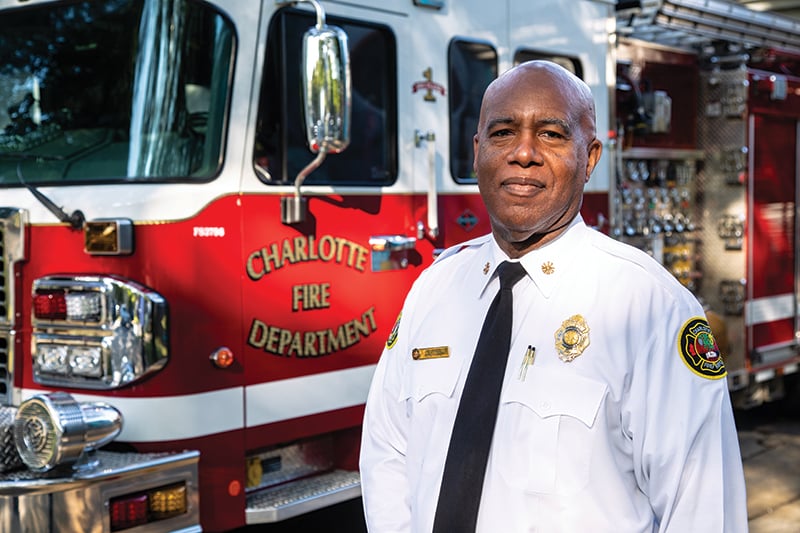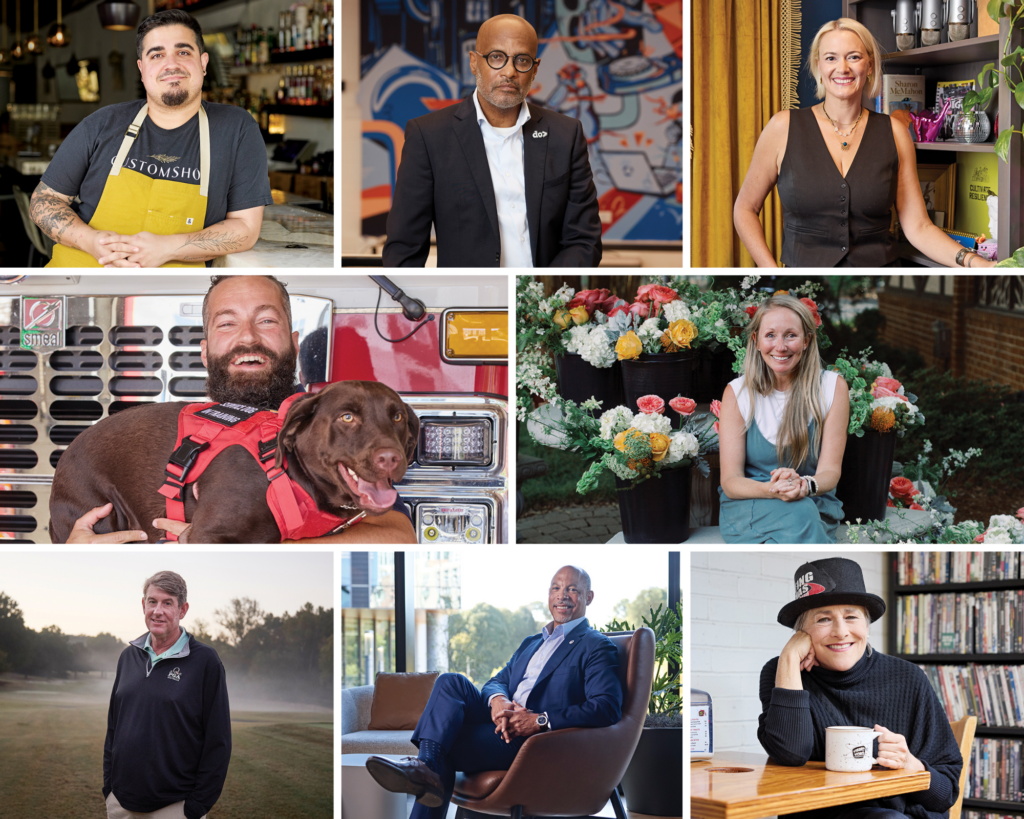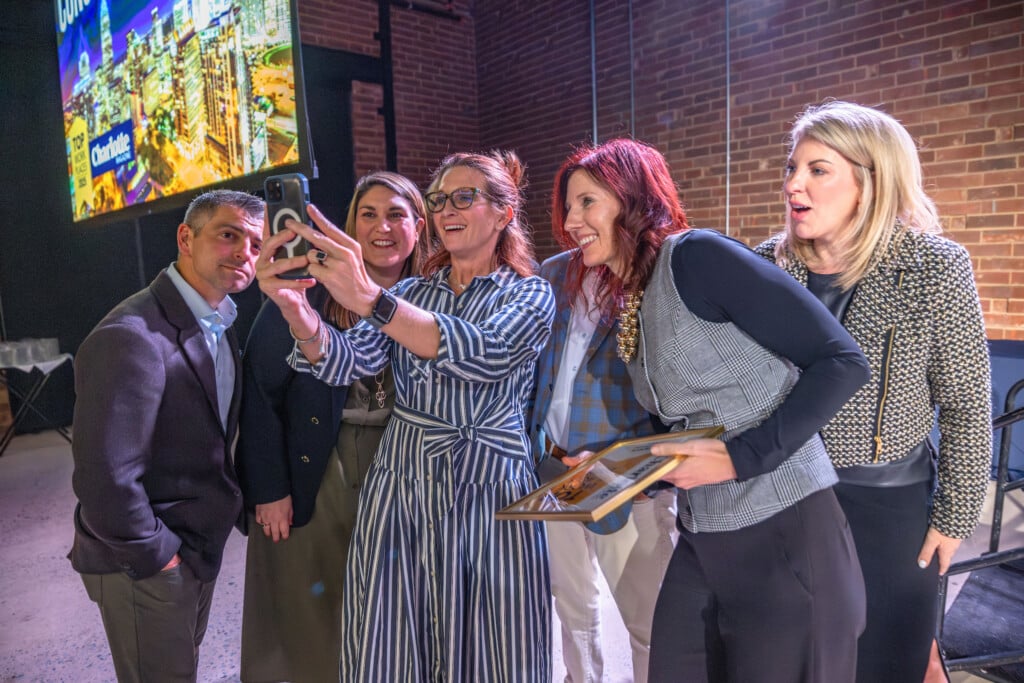Life Lessons: Charlotte Fire Department Deputy Chief, Samuel Jones
The Charlotte Fire Department veteran retires after nearly 35 years—and the worst fire in recent memory

Samuel Jones began recruit school with the Charlotte Fire Department on June 28, 1989, as one of 18 chosen from more than 2,000 applicants. He was 26, a transplant from Bluefield, West Virginia, who hadn’t found his professional footing. He’d moved here in 1986 with his wife, Tina, who’d found a job at a children’s home. Jones worked at a toy store and a car rental agency and drove a truck for Moore’s Potato Chip Co.
Then a neighbor suggested the Fire Department, and Jones applied. His work ethic and genial personality served him well as he climbed the department ladder—from recruit to firefighter, captain, and battalion chief. In 2018, he was named deputy chief of operations, responsible for overseeing the department’s 43 fire stations and their response not only to fires but water rescue, hazardous materials, and medical calls.
Now, he prepares for retirement on Dec. 15, eight days after his 61st birthday. Tina, a language arts teacher at Joseph W. Grier Academy, plans to retire next year, and they intend to do some traveling. He’ll leave with memories of the city’s growth during his time in the CFD—and how that growth led to the most harrowing experience of his career.
On May 18, a five-alarm fire at an apartment building under construction in SouthPark killed two men and summoned more than 90 firefighters from CFD and other departments. They rescued 15 construction workers, including a crane operator suspended 160 feet up for more than an hour, from a blaze that reached more than 2,000 degrees. Twice, firefighters issued mayday calls after they were trapped. The building eventually collapsed. No firefighters were injured.
The cause, still under investigation as of early September, is believed to be accidental, although investigators concluded in June that the site did not meet the state fire code. Jones says it was the most intense fire of his career. “Usually, people wave us down as we arrive,” he says. “The SouthPark fire was the first fire I’ve been to where people were running away.”
Jones’ words have been edited for length and clarity.
With the SouthPark fire, they first said to me, “Hey, Chief, there’s a possible car fire in a garage.” When I arrived, I found the command post and spoke to Chief (Eric) Withers, who was in command and was doing an excellent job. We were about to do a transfer of command, which we always do face-to-face, when there was a “mayday” incident. That means there are trapped firefighters.
We’ve had maydays before, but never when I was on scene. We had four firefighters who couldn’t get out. We don’t stop operations when that happens, but we also have to focus on getting them out. A rapid intervention team was sent to rescue them. Chief Withers was talking to them, trying to find their exact location—when they were able to find a stairwell and make their way out. They ran out of air just as they got out.
I’m proud of the job our firefighters did. But like any incident, we go back and do an analysis to learn what we did right and where we can improve. That’s what we’re doing with this fire. I want to see what an objective person says about it after the analysis.
When you have something that major, you’re so thankful for everyone that got out alive. We were able to rescue 15 people—15 people that we had to put hands on to get them out.
The crane operator was trapped, and we didn’t know if the crane would collapse. Our rescue captain stayed on the phone with him the whole time, talking him through and helping to keep him calm. Our firefighters climbed up the crane ladder to get the operator down. By that time, he had climbed out of the cab because of the heat. He was standing on top of it when we reached him.
We hadn’t seen anything like this before, except in the movies. But we stayed on point and got him down. The crane operator has since met with those firefighters, and they have a special bond.
We haven’t lost a single firefighter in a fire since I’ve been here.
I didn’t grow up knowing I’d be a firefighter, but when I think about it, there were signs pointing me in that direction. It started when I was a young boy and went to the dentist. I was fidgeting and moving around in the chair, and my mom said she’d buy me a firetruck if I sat still. I really wanted the firetruck, so I sat still.
Later, in high school, I was elected fire chief—even though I never ran for the position. My friends had put my name in. It was an honorary position, where you spend a few days with the Bluefield fire chief and do a report to the City Council about your experience. Then, in college, we had to do a labor relations report on a position within a city department or a local business. We picked them out of a hat. I got the fire chief.
Recruit school was very different than I expected. There was so much I didn’t know about fire service that I learned at the academy. It was more intense than I thought it would be.
Back when I was working on the truck, people called the Fire Department any time they needed help—not just fires. One time, there was a 3 a.m. call from a woman who had a bat in the house. I asked why we were going on this call, and was told, “Because they called.” So we went. The bat was flying around the house, and at first, we ran away from it. But eventually we chased it out.
We respond to a lot of medical calls. All of our people in operations—firefighters, captains—are EMTs. They are state certified. The medical calls when children are involved are some of the toughest and most tragic. It stays with you. There was a horrible situation where a father accidentally backed up over a child while driving. Our people also experience homicide scenes—when we respond to a medical call for someone who’s been shot, and then they die from their injuries. At that point, it becomes a homicide.
When a call comes in, we have an expectation of what we’ll see when we get there. It’s in our DNA to stay focused no matter what is happening. You never get away from feeling for people, but we have coping mechanisms. Some of that is compartmentalizing. We also have people to talk to. The department has had a peer support team for more than five years, and last year, we added a behavioral specialist. We also have three therapy dogs. We keep it confidential, so people have their privacy. We keep a lot in.
I never really went home after work and discussed the job. We try not to bring it back with us and tend not to talk about it at home. We talk more among ourselves and try to support each other.
There are some memorable events that stay with you. I had one where we pulled up to an apartment fire in the middle of the night. People were jumping out of windows as the complex burned from one end to the other.
Our training prepares us to be problem solvers, so in a situation like that, we go right into problem-solving mode. We work very well together in those stressful situations. We worked to ensure nobody lost their lives. There were broken bones, but nobody lost their lives, and there were no firefighter injuries. It turned out to be a domestic situation, where someone set the fire. He was later arrested.
I remember one house fire we worked where there were two people who didn’t make it out. We did everything we could, but they succumbed to their injuries before we could get them out. When we were able to get in, we found one of the people had made it to the front door.
I exposed my three kids to all kinds of things and let them choose what they wanted to pursue. My wife and older son are educators, my younger son is a general manager in the hotel industry, and my daughter graduated from college two years ago. She’s getting married this month (September)—to a firefighter.
We are a diverse fire department, and we try to represent the diversity of the city. In the stations, there are great working relationships and a bond that’s like family. When that bell rings, we are brothers and sisters.
I’m finishing this chapter of my life on Dec. 15. Five years is long enough to be in this position. I’ll take a little time off, and then I’ll start looking for what’s next. It’s time to step aside and let someone else come in with their own vision and shape things their own way.
Allison Futterman is a writer in Charlotte.





